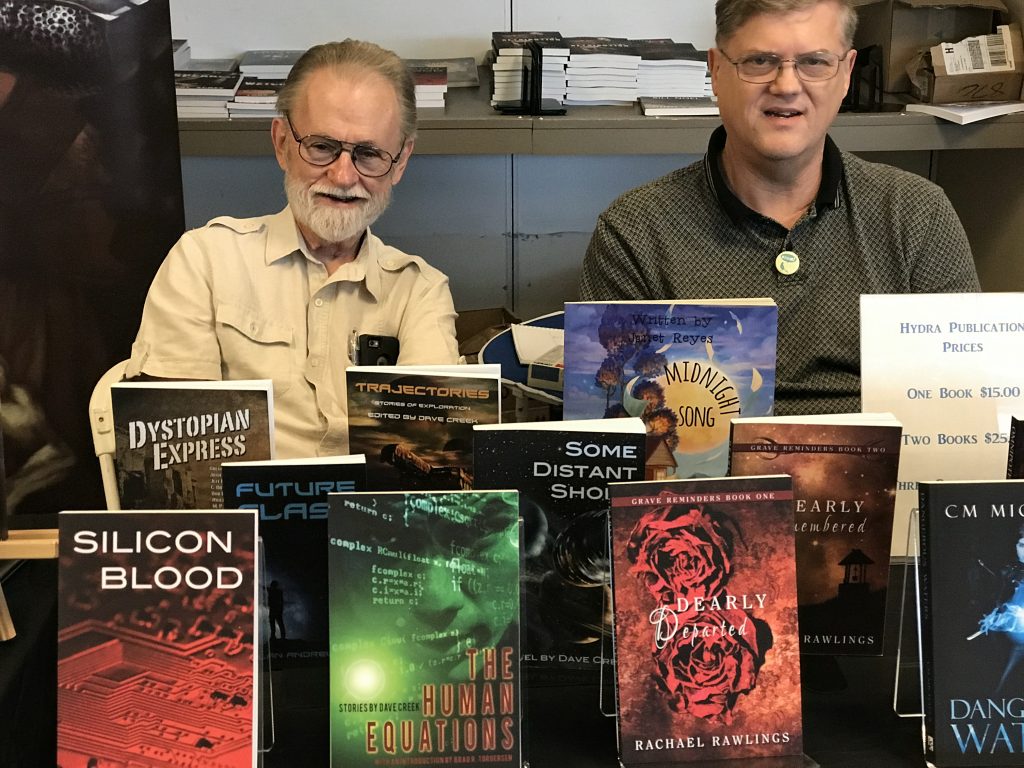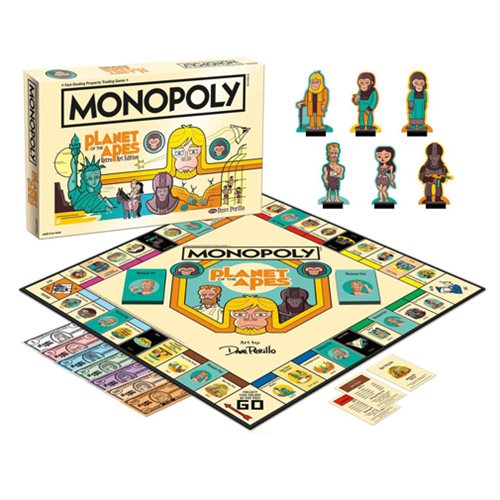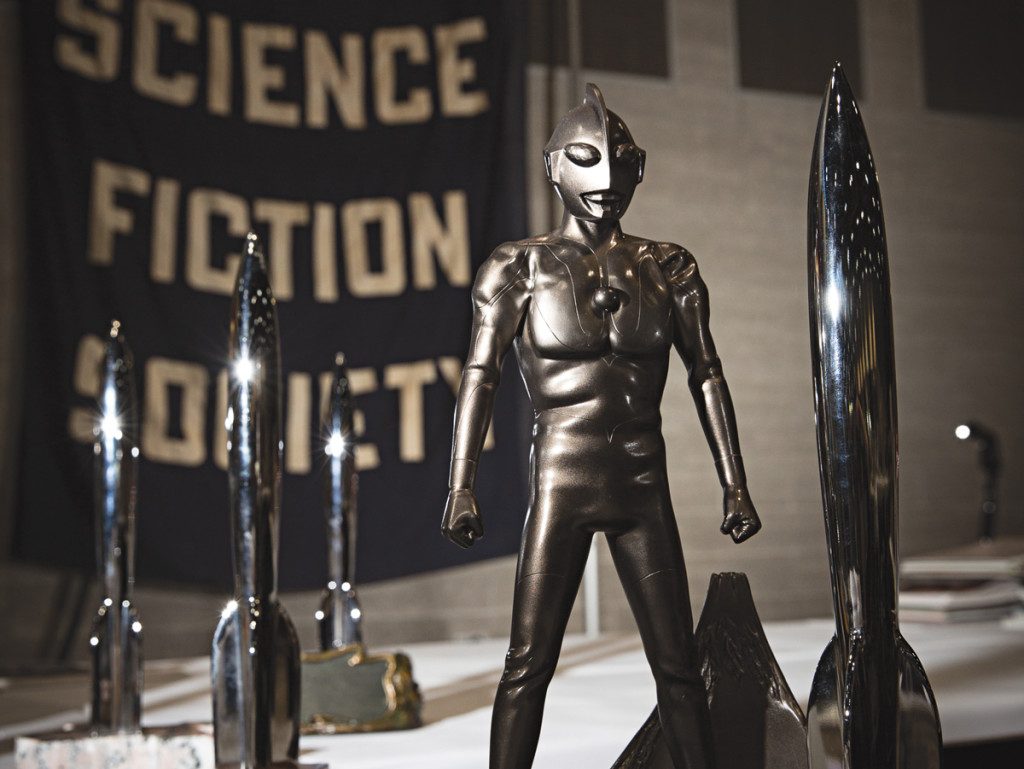(1) FANDOM FEST AFTER ACTION REPORT. Randall and Anne Golden decided they’d go to Louisville’s Fandom Fest despite “Weird Al” Yankovic’s cancelling his appearance. They lowered their expectations and lived to tell the tale in a two-part conreport.
We finished our FandomFest experience and were out the door by 12:30. For the math-curious that’s four hours of two-way driving, one hour spent on the line to get in, forty minutes on ticket exchanges, and 110 minutes on actual conventioning. We’ve done worse for less.
By the end of the day at least a couple hundred more fans had packed into the Macy’s and begun turning into a bona fide crowd. Anne noted that today’s attendance was probably more people than the actual Macy’s had entertained in years. But it was never anywhere near 1700. For a show that once welcomed a five-digit annual attendance, that’s an alarming deceleration.
For a show in its twelfth year, with so many years of experience and resources (you’d think, anyway), that’s a drastic sign either of incompetence, evil, or intentional downsizing. We can’t speak for the innumerable fans still upset with their FandomFest fleecing and still crying out for retribution, but I wish more could be done for them.
- “FandomFest 2017 Photos, Part 2 of 2: Cosplay!” (Like the title says, includes a photo gallery.)
Previously on Midlife Crisis Crossover: on Saturday my wife Anne and I attended FandomFest in Louisville, KY, the twelfth iteration of this entertainment/”comic” convention that’s quite low on comics, heavy on controversy, improper in its online customer service, saddled with a years-old negative image not really helped by the depressing role call of thirty-one canceled guests, and graded a solid F by the Better Business Bureau. But beyond the mountains of baggage, their volunteers were pretty friendly to us in person despite their upper management, and the fifteen actors in the house seemed like decent folks.
Publisher Tony Acree of Hydra Publications talked about the (literal) silver lining he found in the clouds surrounding the con — “Fandom Fest 2017 Day 1 Recap”. (Lots of cosplay photos in his Day 2 and Day 3 recaps.)
What hasn’t changed, is the number of high quality vendors who have been to Fandom year after year. Hydra Publications lucky to be in “Author Corner” along with Stephen Zimmer and Holly Phillippe of Seventh Star Press, the wonderful ladies of Per Bastet, along with Lydia Sherrer, Lacy Marie and my fellow Hydra authors, Arlan Andrew Sr., Dave Creek, Lynn Tincher and Stuart Thaman. Oh. And super editor Josiah Davis.
Despite all the negative news, we sold more books this year on Friday, than we did last year. To you, the fans, we say thank you.
Jeff raises an interesting question – when quoted by the press, the co-organizer of Fandom Fest went by the name Myra Daniels.
https://twitter.com/jefftomars/status/891841162012758017
Noah Bisson posted a video of his walkthrough of the con. Crowding was definitely not an issue.
(2) NO SHOW. Steve Davidson, in “What’s Happening with the TV Show?”, explains why you shouldn’t be looking for an Amazing Stories revival on NBC. For one thing, the check wasn’t in the mail.
I waited for a period of time to determine if I would receive something. After months of waiting and still receiving nothing, a notice of Termination/Breach of Contract was sent to NBC legal, seeing as how pretty much everybody we had previously been working with was no longer with NBC. It sure looked to us like Amazing Stories The TV Show had become an orphan: no showrunner, prior contacts no longer with the company, no word, no checks.
The notice was properly delivered to NBC in May of this year. Despite the fact that the orginal contract would have expired in August of this year, I had completely lost confidence in two things: NBC’s ability to treat me properly AND NBC’s ability to deliver a show.
(3) HE SECONDS. Robert J. Sawyer has added himself to the list of people sponsoring the “Separate Fantasy and Science Fiction Hugo Best-Novel Awards Amendment” submitted by Chris Barkley and Vincent Docherty and discussed here last week.
(4) MOVING DAY FINALLY HERE FOR MACMILLAN. After years of rumors, Macmillan Publishers is really going to bid farewell to the iconic Flatiron Building.
Macmillan Publishers is officially leaving the Flatiron Building, having signed up for 261,000 square feet at Silverstein Properties’ 120 Broadway.
The space will span five full floors, the New York Post reported. In April, sources told The Real Deal the publisher was weighing a move to the Lower Manhattan building, but the size of the space was not clear.
Asking rents at 120 Broadway are in the mid-$50s per square foot, according to the newspaper.
Macmillan is the Flatiron Building’s sole tenant. The property has not been totally empty since it was built more than a century ago. Sorgente Group of America, which owns a majority stake, may rent it out to new tenants or potentially go through with a plan to turn it into a hotel.
(5) SHAKEN UP. A Marvel Comics editor posted a selfie of herself and some coworkers enjoying milkshakes. For this innocuous act, she has been harassed on Twitter: “Female Marvel Comics editor harassed online for milkshake selfie”. (Warning: the harassment is extensively quoted in the article.)
Antos condemned the abuse the following day, writing that “the internet is an awful, horrible, and disgusting place.” She added, “Woke up today to a slew of more garbage tweets and DMs. For being a woman. In comics. Who posted a selfie of her friends getting milkshakes.”
How dare I post a picture of my friends on the internet without expecting to be bullied, insulted, harrassed, and targeted.
— Heather Antos ???? Cleveland FanExpo (@HeatherAntos) July 30, 2017
(6) TODAY IN HISTORY
- July 31, 1971 — Astronauts David Scott and James Irwin became the first people to drive a vehicle on the Moon.
- July 31, 1976 — NASA released the famous “Face on Mars” photo, taken by Viking 1.
- July 31, 1999 — The ashes of astro-geologist Eugene Shoemaker were deposited on the Moon.
(7) TODAY’S BIRTHDAY GIRL
- July 31, 1965 – J.K. Rowling
(8) TODAY’S BIRTHDAY WIZARD
- Born July 31, 1980 – Harry Potter
(9) TODAY’S BIRTHDAY KRYPTONIAN
- Born July 31, 1966 – Dean Cain
(10) COMIC SECTION. Chip Hitchcock recommends today’s Rhymes With Orange.
(11) FILER ALERT. Greg Machlin extends an invite to all Filers in Helsinki for his very first Worldcon panel as a panelist —
Science Fiction & Fantasy in Musical Theatre
Thursday 16:00 – 17:00, 103 (Messukeskus)
Wicked, Into the Woods, Rocky Horror, Little Shop of Horrors – fantasy and science fiction have long been represented in the musical theatre. The panelists discuss their favorites and also perhaps some not-so successful SF musicals.
Emily January, Sari Polvinen (M), Ada Palmer, Greg Machlin, Sami Mustala howeird
Also on the panel: Ada Palmer (Too Like The Lightning).
Machlin adds: As someone who’s written and had produced a fair amount of sci-fi/fantasy theatre (Keith Haring: Pieces of a Life in L.A. in 2014; the one-act “Sushi” all over the place), this is my jam. I may, if the other panelists are patient, present a song from an actual sci-fi musical I wrote the book and lyrics for, The Great Swiss Cheese Conspiracy Theory.
(12) MARLOWE MAKES FINALS. Congratulations to Francis Hamit who is a finalist in the London 2017, New Renaissance Screenwriting Competition. The winners will be announced at the awards ceremony, on August 20.
Christopher Marlowe
Feature Screenplay • Drama, Thriller, War, History, Biography
Francis Hamit
COUNTRY U S A
The poet, playwright and spy lives in two worlds at a time when politics was religion and vice-versa. He is a brilliant playwright and an effective spy but his intemperate ways and desire for power as well as fame combined with a free thinking pose of atheism eventually lead to his death at the hands of his fellow agents at the order of Queen Elizabeth herself. Timeline is from 1585-1593 and includes real events such as the Babington Plot, The execution of Mary, Queen of Scots, and the sailing of the Spanish Armada. Characters based upon real personalities of the time, and extensive research.
(13) LET DARKNESS FALL. The Planetary Post, hosted by Robert Picardo, is devoted to the Total Solar Eclipse coming on August 21.
In this month’s episode, we explore all things eclipse, including a special visit to NASA JPL to see a spacecraft that can create artificial eclipses!
…The Total Solar Eclipse on August 21st is coming up! We’re getting ready with the U.S. National Parks Service and a new Junior Ranger Eclipse Explorer activity book. Also, Starshade is new technology being studied by a team at JPL/NASA and Picardo has the inside scoop.
(14) ON BOARD. The Borg site is impressed with this tie-in edition of the classic game: “Monopoly–Planet of the Apes means a tie-in madhouse for Hasbro”.
For its next franchise tie-in, Hasbro has partnered with 20th Century Fox Consumer Products to release this summer’s strangest mash-up game: Monopoly: Planet of the Apes Retro Art Edition. It’s not just your typical Monopoly tie-in with a popular franchise.
For Monopoly: Planet of the Apes Retro Art Edition, Hasbro tapped artist Dan Perillo to give the game a design it might have had, had it been released when the movie premiered in 1968. Perillo is known for his retro style. One of his works was featured in last year’s Star Trek: 50 Years/50 Artists project (reviewed here at borg.com), and he’s produced some stunning work for Mondo. Perillo’s work for the new Monopoly game should appeal to Planet of the Apes fans, but it’s also a dose of silly fun that will appeal to fans of all things retro.
The standard game is altered–slightly. Instead of paying an Income Tax, in the new edition you get strung up on a spit by your hands and feet and led off. Instead of the joy of landing on Boardwalk you get to discover the ruins of the Statue of Liberty. And that’s Taylor’s marooned space capsule instead of the valuable Short Line railroad. Perillo created six character tokens to choose from: Taylor, Cornelius, Zira, Dr. Zaius, Nova, or a gorilla general (it looks like you could play the gorilla as either General Ursus from Beneath of the Planet of the Apes, Chief of Security Urko from the TV series, or General Aldo from Conquest of the Planet of the Apes). As with all Monopoly editions, the four corners of the gameboard never change.
(15) NEVERTHELESS, HBO PERSISTED. The Wrap, in “HBO Responds to #NoConfederate: Slavery Drama Will Be Handled ‘With Care and Sensitivity’”, says that the hashtag #NoConfederate was the #1 hashtag last weekend. Despite the protests HBO replied they are going to develop this series.
A campaign protesting the planned HBO series “Confederate” flooded social media Sunday night, with viewers tweeting #NoConfederate in massive numbers during “Game of Thrones,” propelling the hashtag to Twitter’s No. 1 trending spot in the U.S. and No. 2 worldwide.
“We have great respect for the dialogue and concern being expressed around ‘Confederate,’” HBO responded in a statement. “We have faith that [writers] Nichelle, Dan, David and Malcolm will approach the subject with care and sensitivity. The project is currently in its infancy so we hope that people will reserve judgment until there is something to see.”
“Confederate” tells an alternate version of history in where the South has seceded from the Union… and slavery has remained legal and continued into the modern era.
(16) WHITE HOUSE BEAT. Camestros Felapton has a scoop: “Breaking news: Talking cat named Whitehouse Communications Director”.
Followed by another scoop: “Breakin News: Timothy the Talking Cat Fired as Whitehouse Communications Director”.
Both stories are dated August 1. How is anybody supposed to compete with someone who gets tomorrow’s cat news today?
(17) THRONE QUESTIONS. Did Camestros and Melisandre graduate from the same J-school? …Vulture has burning questions after “The Queen’s Justice,” the latest episode of “Game of Thrones”:
- Did Varys get a tan on Dragonstone?
- Does Melisandre know how Varys will die?
- Will it all come down to two women battling for the Iron Throne?
- Will Theon ever redeem himself?
- What fate awaits Yara?
- Which city is a worse place to live: Gotham or King’s Landing?
- Will Cersei really marry Euron? And is Euron actually the best thing to ever happen to Jaime?
- How has Cersei not yet grown out that pixie cut?
- Why is Littlefinger quoting True Detective to Sansa?
- We know, Baelish, time is a flat circle. #hbocrossover
- When will Jon find out about his parentage?
- Will Jorah and Sam forge the alliance between Jon and Dany?
- Was that seriously all we get to see of Casterly Rock?
(18) CULTURE WARRIORS. At Nerdist, “Darth Vader and Captain Picard Face Off for a Sci-Fi Debate”. Click through to see the debate between two toys.
When you have toys, all things are possible, including a dream crossover between Star Wars and Star Trek: The Next Generation! In the new episode of Toy Shelf, we finally get to see what happens when Captain Jean-Luc Picard of the Federation starship Enterprise encounters the Dark Lord of the Sith: Darth Vader!
Keep in mind that these are toys that know they are toys. And Vader catches Picard as he goes for more of a cowboy diplomacy by swinging a lightsaber around. It’s pretty much the laser sword of Picard’s dreams, and if Vader was looking to tempt the Captain to the Dark Side of the Force, then he would have a pretty good head start.
(19) RARITY. Ashley Hoffman of TIME, in “A Super Rare Copy of Super Mario Bros. Just Sold for $30,000 on eBay”, says that a copy of “Super Mario Bros. that has been sealed since its release in 1985 and never opened just sold for $30,100 on eBay
To outsiders, that may seem like a high cost to become the proud owner of a game, but they might not appreciate the most exciting feature, which distinguishes this Nintendo Entertainment System game from all those unwrapped $10 versions: a hangtag on the back that indicates the copy originates from back when video games hung on pegs in stores.
“They said the reason that game went for so much was because Mario was always sold in the system,” CEO Drew Steimel told Mashable quoting the experts of Reddit. “You bought it with the system, it came in the box. This particular copy was from before that happened, before Nintendo decided to bundle them. They only did it for a short time.”
You read that right. No box for this game, hence its final price.
(20) BOTTLED LIGHTNING. I would have answered yes if the question had been, “Should I use this to launch a torpedo?”
So, I don't usually drink, but this seems a good one to start with. Thoughts? pic.twitter.com/YhQk0sHFBJ
— John Scalzi (@scalzi) July 30, 2017
(21) HARD SCIENCE FICTION. The 1910 Thomas Edison production A Trip To Mars begins with “The Discovery of Reverse Gravity.”
[Thanks to rcade, Martin Morse Wooster, JJ, Cat Eldridge, Carl Slaughter, Greg Machlin, Francis Hamit, and John King Tarpinian for some of these stories. Title credit goes to File 770 contributing editor of the day Bill.]




